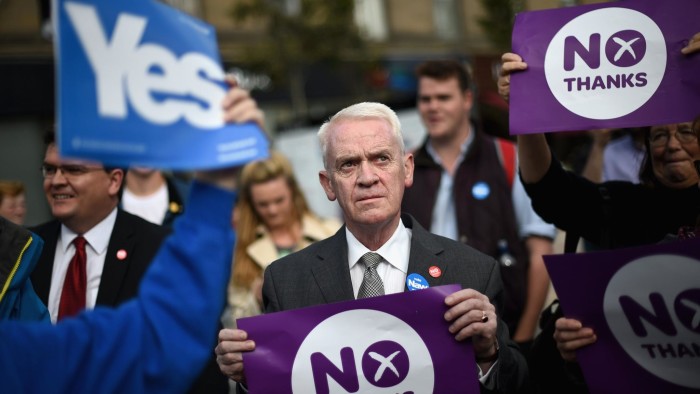How a Yes would make enemies and alienate peoples


Roula Khalaf, Editor of the FT, selects her favourite stories in this weekly newsletter.
The small minority of British people who live in Scotland have been receiving an unnatural degree of attention this past week from the more than 90 per cent who do not. For months we have been comforted by opinion polls pointing to a convincing victory for the unionists, whose position is backed by the vast majority of Britons. But as support for Scottish independence has surged, concern is spreading.
South of the border there is surprise at some of the arguments that seem to have gained traction. Since Scotland already controls healthcare, how can the preservation of the National Health Service have become contentious? There is bemusement that elements of Scottish opinion think the country receives such a raw deal from the UK government, when it is richer than all but two of England’s nine regions. And there is a nagging concern that the rest of Britain will have to buy off Scotland’s malcontents if the country narrowly decides to stay in the union.
The paradox of next Thursday’s referendum is that, if there is a Yes vote, it is the last moment the rest of Britain will take notice of Scottish opinion. The people of Wales, Northern Ireland and especially England will find their voices. It is above all the English public mood that politicians will have to follow if they are to be elected. That is likely to be loud and far from pretty.
The feeling of rejection is bad enough. If a Yes vote also brings unnecessary economic turmoil, the terms of separation from the rest of Britain will see Scotland wave goodbye to many concessions.
Candidates standing in the UK’s 2015 general election will be forced to take a view on the terms of Scotland’s secession. For English MPs, a reasonable platform for the negotiations could rest on the following five principles.
First, the rump UK is the continuing state. Though diminished, it will retain all of its existing institutions unchanged unless it chooses to make alterations.
Second, this continuing state will provide no financial insurance to an independent Scotland. In the financial crisis, Britain provided some bilateral loans to Ireland because that country was seen as unfortunate. Scotland would be seen as wilful, rather like Iceland.
Third, assets and liabilities will be fairly distributed on a per head basis. As Professor Paul Collier of Oxford university has persuasively argued, there is no reason to consider the North Sea oil that has already been discovered Scottish – just as the Edinburgh government would balk at a claim to those assets from a separatist movement in the Shetland Islands.
Fourth, the rest of the UK will be willing to share institutions so long as there is no net cost to taxpayers and voters south of the border agree. Scotland can have its share of the monarchy; we can probably do a deal so it pays a fair price for a continued BBC, universal postal service and naval protection. The new Scotland is not entitled to any of this; it must bargain for it. UK state institutions are a construct of the UK government, from which Scotland would be voluntarily leaving. That includes access to the central bank and management of the currency.
Fifth, Scotland cannot become a backdoor route into the UK. That means border controls in Berwick and Gretna if immigration controls further north fail to meet Westminster’s tastes. It means ensuring regulated companies, such as banks, that have most of their customers in the UK will need to domicile there. If an independent Scottish government lures businesses with low corporate tax rates, the rump UK will be minded to follow suit, to staunch the loss of revenues.
Of course, such an ugly English nationalistic stance after a Yes vote would be highly regrettable. At times it might not even be rational, given that Scotland will still be England’s second-largest trading partner. However, parties offering a weaker prospectus to the English electorate can expect a torrid time in 2015.
While the velvet divorce of Czechoslovakia is often cited as a precedent, it is no parallel. Then, separation was sought by politicians on both sides. If the Yes campaign wins next Thursday, the simmering resentment of the English will come to the fore and prevent Scotland cherry-picking the UK institutions it likes. Rejection is a raw emotion, and hell hath no fury like an electorate scorned.
Comments